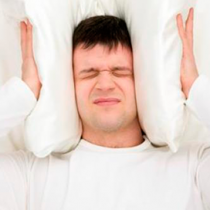
Noise pollution is one of the pollutions that most affects both auditory and mental health. A type of pollution that is complex to measure and that leaves no residues such as chemical or water pollution.
According to the Ministry of the Environment, some studies state that vehicular traffic is responsible for more than 70% of the environmental noise in the city, which may reportedly depend on factors such as road characteristics, type of vehicle including light, heavy or motorcycles and the conditions of use of the horn, the state of the urban infrastructure, among others.
This is why this type of pollution affects both the hearing and mental health of many people. Extensive exposure to noise could face physiological effects such as hearing loss or tinnitus, which is associated with constant ringing in the ears.
Noise pollution and its effect on mental health
The World Health Organization said noise is a serious threat to human health that causes stress, disrupts sleep and even causes cardiovascular disease. As for vehicle noise, it is a pollution problem that has recently exponentially affected people’s mental health.
According to the clinical psychologist of Psyalive.com, Natalia Mendel, explains that this consequently affects symptoms such as mental irritation, communication as well as confusion.
“It can also be in the motor coordination and sense of orientation, headache, also produces concentration reduced by exposure to this type of contamination”, explains the expert.
According to the expert in clinical psychology, what a worker needs is training where these stressful effects are informed and the company can provide techniques to reduce their effects.
“Controlling exposure times, if they are also tested is ideal to observe the habituation to these and reduce accidents or work events, which also implies that the damage / loss of hearing by noise pollution the person”, says Natalia.
On the other hand, ambient noise due to noise pollution alters sleep, since it is a process of high organization. “If the person already experiences the aforementioned symptoms, if this type of contamination is maintained or the exposure was very intense and sudden, at the level of the body effects such as increased heart rate, varied body movement, changes in breathing, stomach discomfort, etc., which leads as a consequence that not being able to relax and many people choose to self-medicate to regulate sleep, which is not recommended, and a diagnosis is needed with a specialist, “he says. Mendel
Ambient noise, a threat to hearing
In Chile, 50% of the environmental complaints received by the Superintendency of the Environment correspond to the polluting noise. According to a survey conducted by the Ministry of the Environment in 2018, 5% of respondents indicate that the main problem affecting them is noise, after air, garbage and water pollution.
Dr. Christian Olavarría, specialized in otolaryngology, states that environmental noise has always been a problem in large cities and unfortunately we are less aware of its danger, although possibly due to lack of information. “Exposure to noise produces not only possible damage at the auditory level but also at the psychological level, increasing levels of stress, insomnia, among others,” he says.
“At the auditory level, exposure to loud noises, or prolonged exposure, even if they are not as intense, can cause transient hearing loss and if the stimulus of the noise persists, it can be permanent, “says the specialist of Clínica Santa María.
“One of the symptoms of incipient hearing damage may be the presence of tinnitus, which is the perception of a noise or bell in the ears, there may also be a feeling of glooming ears or even dizziness. In general, the noise we are exposed to on the street is variable,” he explains, based on the consequences it can have on hearing.
According to Dr. Olavarría, he explains that an exposure above 80 decibels for more than 8 hours could already be harmful to the ear, “And the louder the noise it takes, the less exposure time it takes to damage itself,” he concludes.
Finally, the OECD defines as acceptable and unacceptable thedecibels, both for the day and night period, which means acceptable at less than 65 db during the day and less than 55 db at night.





